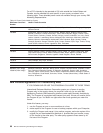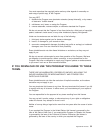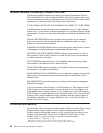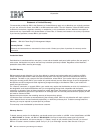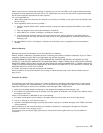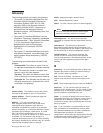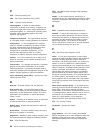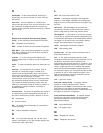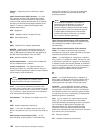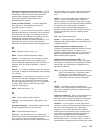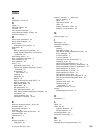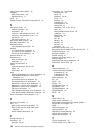Peripheral Component Interconnect (PCI). The PCI
Local Bus is a high performance 32-bit or 64-bit bus. It
is intended for use as an interconnect mechanism
between highly integrated peripheral controller
components, peripheral add-in boards, and
processor/memory systems.
power-on self-test (POST). A series of diagnostic
tests that are run automatically each time the
computer’s power is turned on.
protocol. (1) A set of semantic and syntactic rules that
determines the behavior of functional units in achieving
communication. (2) In SNA, the meanings of and the
sequencing rules for requests and responses used for
managing the network, transferring data, and
synchronizing the states of network components. (3) A
specification for the format and relative timing of
information exchanged between communicating parties.
R
RAM. Random access memory. (A)
RARP. Reverse Address Resolution Protocol.
register. (1) A storage area in a computer’s memory
where specific data is stored. (2) A storage device
having a specified storage capacity such as bit, byte, or
computer word, and usually intended for a special
purpose.
remove. (1) To take an attaching device off a network.
(2) To stop an adapter from participating in data passing
on a network.
ring segment. A ring segment is any section of a ring
that can be isolated (by unplugging connectors) from
the rest of the ring. A segment can consist of a single
lobe, the cable between access units, or a combination
of cables, lobes, and/or access units. See cable
segment, LAN segment.
ROM. Read only memory. (A)
S
SCSI. Small computer system interface.
segment. See cable segment, LAN segment, ring
segment.
shielded twisted pair. A transmission medium of two
twisted conductors with a foil or braid shell.
SMP. System Modification Program
soft error. An intermittent error on a network that
causes data to have to be transmitted more than once
to be received. A soft error affects the network’s
performance but does not, by itself, affect the network’s
overall reliability. If the number of soft errors becomes
excessive, reliability is affected. Contrast with hard
error.
station. (1) A communication device attached to a
network. The term used most often in LANs is an
attaching device or workstation. (2) An input or output
point of a system that uses telecommunication facilities;
for example, one or more systems, computers,
terminals, devices, and associated programs at a
particular location that can send or receive data over a
telecommunication line. See also attaching device,
workstation.
STP. See shielded twisted pair.
system. In data processing, a collection of people,
machines, and methods organized to accomplish a set
of specific functions.
Systems Application Architecture (SAA). An
architecture developed by IBM that consists of a set of
selected software interfaces, conventions, and
protocols, and that serves as a common framework for
application development, portability, and use across
different IBM hardware systems.
Systems Network Architecture (SNA). The
description of the logical structure, formats, protocols,
and operational sequences for transmitting information
units through, and controlling the configuration and
operation of, networks.
Note: The layered structure of SNA allows the ultimate
origins and destinations of information, that is,
the end users, to be independent of and
unaffected by the specific SNA network services
and facilities used for information exchange.
T
TCP/IP. Transmission Control Protocol/Internet
Protocol. A set of communication protocols that support
peer-to-peer connectivity functions for both local and
wide area networks.
telephone twisted pair. One or more twisted pairs of
copper wire in the unshielded voice-grade cable
commonly used to connect a telephone to its wall jack.
Also referred to as “unshielded twisted pair” (UTP).
threshold. (1) A level, point, or value above which
something is true or will take place and below which it is
not true or will not take place. (2) In IBM bridge
programs, a value set for the maximum number of
frames that are not forwarded across a bridge due to
errors, before a “threshold exceeded” occurrence is
counted and indicated to network management
programs. (3) An initial value from which a counter is
decremented to zero, or a value to which a counter is
incremented or decremented from an initial value. When
Glossary 101



